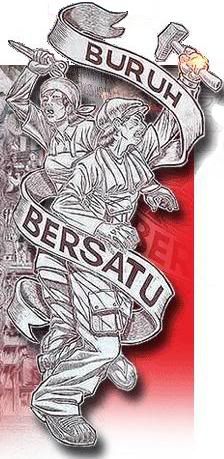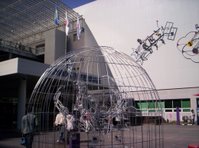 Klik sini untuk membeli Buku dan VCD Keadilan terbaru !
Klik sini untuk membeli Buku dan VCD Keadilan terbaru !

Bangkitlah Kaum Buruh & Petani
Menentang Ekstremis & Hipokrits!

~ faisal mustaffa online ~
Tuesday, December 05, 2006
Gwangju: “The Culture Hub of Asia”

Gwangju which is four hours driving from Incheon International Airport, South Korea is expected to be a hub city where world cultures and Asian cultures in particular are rediscovered, recreated and then exchanged by sharing historic and spiritual assets Gwangju has with other peoples in Asia.
I achieving the vision, Faisal Mustaffa who were given the opportunity to visit the city managed to meet the Chief Executive Officer of The Executive Agency for Culture Cities, MR. LEE YOUNG JIN, the Chief Executive Officer of The Executive Agency for Culture Cities.
Gwangju City’s goal is to become “The Culture Hub of Asia.”
The Project of "A Culture Hub City of Asia, Gwangju" is the first futuristic urban development model in Asia in that culture lies in its core theme, and hence the development of Gwangju will act as a leverage for that of other cities not only in Korea but also in Asian countries. In the future, Presidential Committee for Culture Cities will upgrade other culture cities in Korea as world-class culture cities in name and reality, and by doing so, will lay a firm foundation so that Korea can position itself as a pivot nation leading the exchanges of Asian cultures.
The Project of "A Culture Hub City of Asia, Gwangju" is a very ambitious culture scheme, which is the first attempt of its kind since the foundation of Korea to achieve balanced national development and decentralization of power through culture. The historic value and significance of this Project lies in innovating Gwangju into a new city of the 21st century through forming "Creation City," "Learning City," and "Futuristic City" as a neo-humanistic urban development model. Presidential Committee for Culture Cities aims to set up a national model of urban development by upgrading culturally time-honored cities like Gwangju through differentiated strategies and, by doing so, to construct a culture state ultimately.
Steps being taken to achieve this vision
We have outlined the following strategies to achieve this vision:
Children`s Educational Culture City: Gwangju will be the city where citizens don`t have to imigrate for their children`s education, and, therefore, it will be branded as "Paradise for Education and Culture."
Health City: Gwangju will be the city equipped with the best infrastructure for health and safety.
Media Learning City: Gwangju will be the city where citizens produce and distribute media products directly.
Lifelong Learning City: Gwangju will be the city where opportunities are open for adults to learn and recharge themselves for their lifetime.
Eco City and Feng-Shui City: Gwangju will be the city having environment-friendly strategies which are unique to Asia.
Participatory Political Culture City: Gwangju will be the city where citizens' political activities are unfolded on a voluntary base as part of their everyday life.
City of Culture-led Economy: Gwangju will be the city initiating the model at the national level that culture becomes the driving force for economic development
City of Multi-Culture and International Culture: Gwangju will be the city where anyone can express his/her own thoughts freely regardless of religion, race, culture and political ideology.
 City of Education and Culture; City of Networks: Gwangju will be the city where each part of the city is networked one another for citizens' everyday learning and creation activities.
City of Education and Culture; City of Networks: Gwangju will be the city where each part of the city is networked one another for citizens' everyday learning and creation activities.New Science City of Asia: Gwangju will be the city where inherited sciences of Asia will be advanced into modern ones.
The background history of this project
This project was advocated in 2002 by Roh Moo-Hyun , the President candidate at that time, as one of his election pledges to create a futuristic urban development model through balanced national development and culture. Then, this project has been put forward as a scheme at the national policy level since March, 2004 when Presidential Committee for Culture Cities was inaugurated. This is the state-initiated culture project, which is the largest of its kind in scale since the foundation of Korea, requiring financial resources of over $1.8 billion until the year 2023.
Why Gwangju City?

Gwangju is the city which has fought endlessly for the universal values of Mankind through the long history of 5,000 years. Hence, Gwangju is the city symbolizing Democracy, Human Right and Peace. As well, Gwangju is the city which has got unyieldingly through the history of estrangement and exclusion which most Asians have commonly experienced. Together with all Asians, Gwangju will try to find alternative solutions to Modernization and Industrialization which have reached their uppermost limit. City of Cultures and Arts : Gwangju has been the city of cultures and arts sharing deeper thoughts on life and human beings with neighbors through its long history of resistance, and sublimating them into elegant pursuits and arts.
The significance of Gwangju City
Gwangju stands at 126 degrees 40 minutes of East Longitude and at 35 degrees 10 minutes of North Latitude, enabling many cities in Asia to interact within one hour flight.
 Gwangju has preserved the taste of traditional Korean food. Hence, as the city of taste, Gwangju is famous for the variety and delicacy of Gwangju dishes. Gwangju holds "Gimchi Festival" every year having Gimchi, the representative food of Korea, as its theme.
Gwangju has preserved the taste of traditional Korean food. Hence, as the city of taste, Gwangju is famous for the variety and delicacy of Gwangju dishes. Gwangju holds "Gimchi Festival" every year having Gimchi, the representative food of Korea, as its theme. Gwangju is surrounded by the famous mountain Mudeung which is over 1,000m high above sea level. It keeps many cultural heritages and superb natural beauty. The word "Mudeung" of Mountain Mudeung means "class-less," and hence Mt. Mudeung seems to show the spiritual landmark of Gwangju. In addition to the beauty of 4 seasons of Mt. Mudeung, Gwangju has 8 Great Scenic Beauties : Bingwoldang and the Watery Mist at Hwangryong River; May 18 Democracy Square and The Night View at ChungJangno Street; Pochungsa Temple and the Plains of Daechon; The Sun-Rising at Sajik Park; and The Night View at Jatgogae Hill; The Moon-Greeting at the World Cup Soccer Stadium; and The Walking Course at Jungoe Park.

Gwangju is called "The Hometown of Artists" since Gwangju has produced many outstanding artists and culture masters such as: Baek-Rhyeon Huh in Korean Painting; Jiho Oh in Western Painting; BangUl Im in Pansori(Traditional Korean Opera); and Yongcheol Park in Lyric Poem. Gwangju hosts the world-class international arts festival, "Gwangju Biennale," which serves as a driving force to make Gwangju the city of culture and arts. Its main industries are : Auto Industry; Information and Electronic Household Goods Industry; and Optical Industry. Gwangju is now fostering 4 strategic industries, which are futuristic growing industries, as follows : Ultra-Modern Parts Material Industry; Design Industry; New Energy Industry; and Culture Contents Industry.



3 Comments:
hi there, Faisal!
so nice to see your blog! i'll go checking later. thanks for writing up about Gwangju :-)
Dear Marj
Thanks for visiting my blog.
I miss Korea.
Acai,
You miss Korea? Come here lah.... If you have a family who work for MAS, you can get cheap ticket around RM 600 (return).
Post a Comment
<< Home